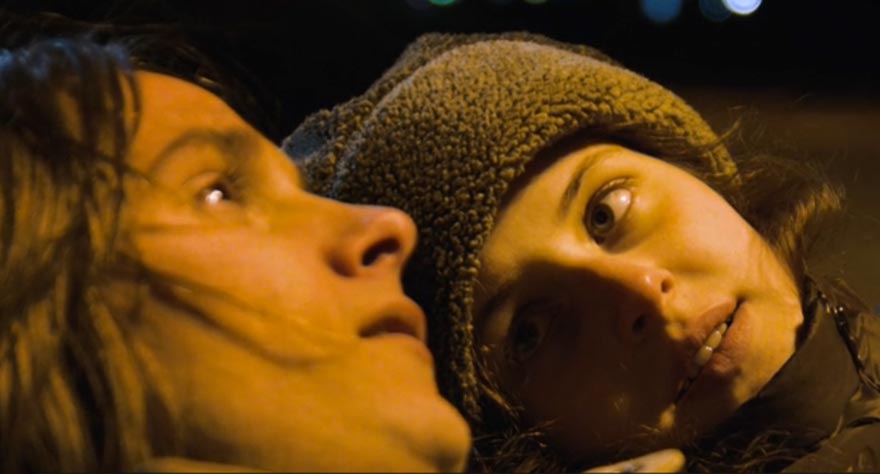
Four high school friends spend a night together in this true-to-life depiction of teenagers on the cusp.

Four high school friends spend a night together in this true-to-life depiction of teenagers on the cusp.
It’s an interesting sensation, and one of the more unique aspects of film, to experience the flux between spectator and consort. To pass judgment one moment, and then to find oneself represented on-screen the next. With his first foray into writing, directing and starring in a feature film, young filmmaker Matthew Brown presents a very natural, and at times tediously sincere, portrayal of one night in the life of a group of high school friends. The longer we’re given time with these four average, Normaltown, USA friends, the more their range of emotions and life approaches resonate and serve to remind those of us who left high school behind many years ago of just how significant a period of time it really is in forming our selves.
Brown plays William, the eldest in his group of friends and designated driver. One cold winter night he and his three best friends Eric (Gabriel Arant), Gary (Joshua Pagan), and Alissa (Emma Corley Geer) do their best to avoid going home but also decide against heading to a party going on. When they hear the party was broken up by the police, Alissa’s friend Kate asks for a ride home from the party for her and her friend Alexa. William, harboring a long-time crush on Alexa finds himself presented with the ingredients for what could be a truly memorable evening. He agrees to pick them up and is almost immediately thwarted when Kate and Alexa decide to just go home and sleep at Kate’s. But Kate’s mom won’t let Alexa in and William invites her to join the group as they wander toward morning.
The group heads first to a hot tub at Eric’s house where Alissa does her best not to be self-conscious around the beautiful and popular Alexa, joking to her about how happy she is to no longer be the only girl in the group for once, her face betraying that she clearly feels the opposite. William does his best to play it cool around Alexa, but sad news puts a serious spin on their fanatics as they learn that one of the teens who left the party earlier died in a car accident on his way home. William is the only one of the group to have known him in close capacity and he conceals the gravity of this news under his teenaged ambivalence.
Admittedly the film’s slow opening feels like we are about to be shown an iPhone’s view of the banal nightlife of rural teenagers. I felt like 30-going-on-90 as I refrained from yelling at the characters to stop mumbling and wasting gas just to avoid their warm beds. But watching William cope with the news of a friend’s death (and indeed mortality altogether) over the course of the evening, and seeing the very real possibility that he may get what he most hopes for with Alexa, and hearing him casually but endearingly discuss his future prospects and plans with his optimistic and encouraging best friend Alissa, slowly sucked me back into my 18-year-old body facing the cusp of adulthood and cleaving to my friends and everything that felt familiar.
It may not be at all times enlivening, amusing, or all that intricate in its plot, but In the Treetops is one of the most authentic representations of that magic moment before one transitions to adulthood. It’s a moment with very little perspective given the shortness of one’s life, and yet every emotion is felt so hugely and every detail seems so significant. Despite his casual coolness, William’s affection for his friends is made clear, his sympathy around their family situations, and his burgeoning adult understanding of the difference between lust and love and how one comes fast and fades quickly, while the other comes slowly and can last forever.
The film’s visuals—camerawork by Donald Monroe—aren’t especially complicated, but are just handheld enough and tightly focused on the characters so as to give off a feeling of being another member of the group. This film isn’t meant to be watched casually, the gems within it lie in seeing the way Alissa’s eyes watch William as she tentatively scopes out his plans for the future, her hope for her own part in that future made obvious in what those eyes convey. Or in how Gary and William bicker over Gary borrowing his jacket, only for William to understand the broader significance of showing his best friend that he has his back even if it’s in the simple act of sharing clothing.
While other teen-centric films tend to focus on the nostalgia, ease, or the comparatively silly drama of the teen years, this film expertly—and it may have to do with the age of its filmmaker—depicts a true-to-life window into the average American teenage experience. Looking past its slower moments—though they hold their importance in the accuracy of boredom in the teenage world—In the Treetops establishes two very naturalistic actors in Matthew Brown and Emma Corley Geer, and if Brown continues to grow with his art, and maintains his attention to truth and nuance, it appears we have a very promising new filmmaker on the scene.